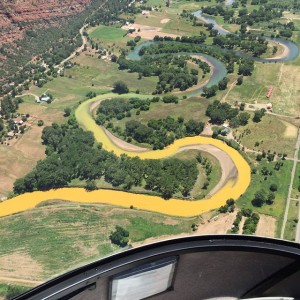
By Sara Lu, Colorado State Director Last weekend, I was heartbroken as I watched the Animas River turn orange. For those of you who have not had the occasion to visit the Animas River or drive through some of its mountain towns like Silverton, simply driving by can seem as though you are inserting yourself into a John Fielder or Ansel Adams photo. The rugged mountain vistas, situated above vast groves of aspen and evergreen trees, and the floor of wild flowers and mosses. Countless hours are often spent rafting and fishing the Animas river. While the spill is dramatic, waste leaking from abandoned mines (also known as tailings) into our rivers and streams is a reality in across the west. The Animas River has seen blowouts and every day contamination from mining for more than a century. As recently as 1991, there were no fish in the river near Silverton. After a cleanup effort (in lieu of a Superfund designation), the fish returned by the early 2000's. Then they were wiped out when acid mine drainage began leaking from Gold King, again. This time around EPA was attempting to clean up a mess left behind by an industry that for the better part of a century was left unregulated and unchecked. Silverton and many other little towns and ghost towns along the Animas River were founded on gold and silver mining. Across the nation there are about 500,000 old heavy metal mines. The law that created the rush and settled the west contains no environmental provisions, requires no cleanup when the mine is exhausted, and doesn't force the company to pay for legacy pollution. The waste that heavy metal mines produce is toxic. It contains lead, mercury, cadmium, and arsenic, among others. We know these substances can cause cancer and developmental disabilities with prolonged exposure. Still, action to remediate these mines has been slow and funding is non-existent. These mines which were built and operated with zero regulatory oversight or standards for decades. The spill on the Animas is a disaster for communities in three states. However, if we're smart, we learn from this. This spill, along with what the public has learned about the hundreds of thousands of old and abandoned heavy metal mines leaking tailings into our rivers and streams, makes the case that we need to act like our water matters. We need stronger regulations to safeguard and protect our water sources. We need to put drinking water first.


